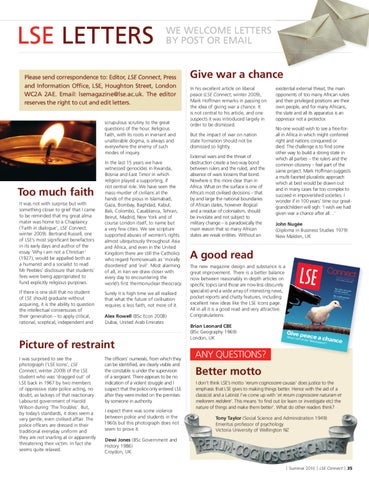LSE LETTERS
WE WELCOME LETTERS BY POST OR EMAIL
Please send correspondence to: Editor, LSE Connect, Press and Information Office, LSE, Houghton Street, London WC2A 2AE. Email: lsemagazine@lse.ac.uk. The editor reserves the right to cut and edit letters. scrupulous scrutiny to the great questions of the hour. Religious faith, with its roots in inerrant and unalterable dogma, is always and everywhere the enemy of such modes of inquiry.
Too much faith It was not with surprise but with something closer to grief that I came to be reminded that my great alma mater was home to a Chaplaincy (‘Faith in dialogue’, LSE Connect, winter 2009). Bertrand Russell, one of LSE’s most significant benefactors in its early days and author of the essay ‘Why I am not a Christian’ (1927), would be appalled both as a humanist and a socialist to read Mr Peebles’ disclosure that students’ fees were being appropriated to fund explicitly religious purposes. If there is one skill that no student of LSE should graduate without acquiring, it is the ability to question the intellectual consensuses of their generation – to apply critical, rational, sceptical, independent and
In the last 15 years we have witnessed genocides in Rwanda, Bosnia and East Timor in which religion played a supporting, if not central role. We have seen the mass-murder of civilians at the hands of the pious in Islamabad, Gaza, Bombay, Baghdad, Kabul, Bali, Colombo, Casablanca, Tehran, Beirut, Madrid, New York and of course London itself, to name but a very few cities. We see scripture supported abuses of women’s rights almost ubiquitously throughout Asia and Africa, and even in the United Kingdom there are still the Catholics who regard homosexuals as ‘morally disordered’ and ‘evil’. Most alarming of all, in Iran we draw closer with every day to encountering the world’s first thermonuclear theocracy. Surely it is high time we all realised that what the future of civilisation requires is less faith, not more of it. Alex Rowell (BSc Econ 2008) Dubai, United Arab Emirates
Picture of restraint I was surprised to see the photograph (‘LSE Icons’, LSE Connect, winter 2009) of the LSE student who was ‘dragged out’ of LSE back in 1967 by two members of oppressive state police acting, no doubt, as lackeys of that reactionary Labourist government of Harold Wilson during ‘The Troubles’. But, by today’s standards, it does seem a very gentle, even civilised affair. The police officers are dressed in their traditional everyday uniform and they are not snarling at or apparently threatening their victim. In fact she seems quite relaxed.
The officers’ numerals, from which they can be identified, are clearly visible and the constable is under the supervision of a sergeant. There appears to be no indication of a violent struggle and I suspect that the police only entered LSE after they were invited on the premises by someone in authority. I expect there was some violence between police and students in the 1960s but this photograph does not seem to prove it.
Give war a chance In his excellent article on liberal peace (LSE Connect, winter 2009), Mark Hoffman remarks in passing on the idea of giving war a chance. It is not central to his article, and one suspects it was introduced largely in order to be dismissed. But the impact of war on nation state formation should not be dismissed so lightly. External wars and the threat of destruction create a two way bond between rulers and the ruled, and the absence of wars loosens that bond. Nowhere is this more clear than in Africa. What on the surface is one of Africa’s most civilised decisions – that by and large the national boundaries of African states, however illogical and a residue of colonialism, should be inviolate and not subject to military change – is paradoxically the main reason that so many African states are weak entities. Without an
existential external threat, the main opponents of too many African rulers and their privileged positions are their own people, and for many Africans, the state and all its apparatus is an oppressor not a protector. No-one would wish to see a free-forall in Africa in which might conferred right and nations conquered or died. The challenge is to find some other way to build a strong state in which all parties – the rulers and the common citizenry – feel part of the same project. Mark Hoffman suggests a multi-faceted pluralistic approach which at best would be drawn out and in many cases far too complex to succeed in impoverished societies. I wonder if in 100 years’ time our greatgrandchildren will sigh: ‘I wish we had given war a chance after all…’ John Nugée (Diploma in Business Studies 1979) New Malden, UK
A good read The new magazine design and substance is a great improvement. There is a better balance now between reasonably in-depth articles on specific topics (and those are now less obscurely specialist) and a wide array of interesting news, pocket reports and chatty features, including excellent new ideas like the LSE Icons page. All in all it is a good read and very attractive. Congratulations. Brian Leonard CBE (BSc Geography 1969) London, UK
ANY QUESTIONS?
Better motto I don’t think LSE’s motto ‘rerum cognoscere causas’ does justice to the emphasis that LSE gives to making things better. Hence with the aid of a classicist and a Latinist I’ve come up with ‘et rerum cognoscere naturam et meliorem reddere’. This means ‘to find out (or learn or investigate etc) the nature of things and make them better’. What do other readers think? Tony Taylor (Social Science and Administration 1949) Emeritus professor of psychology Victoria University of Wellington NZ
Dewi Jones (BSc Government and History 1986) Croydon, UK
I
10_0007 LSEConnect_MASTERindd.indd 35
Summer 2010
I
LSE Connect
I
35
7/5/10 14:48:59
